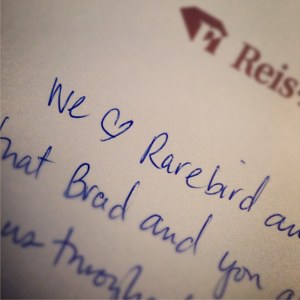
I’M THANKFUL THAT PEOPLE FEEL THIS WAY ABOUT THE TEAM AT @RAREBIRDINC. THANKS @REISNICHOLS!
Success is a funny (and often fleeting) thing. One day, you’re on top of the world, the next you’re tumbling into an abyss. Or, on a smaller scale, one minute you feel great, and the next — just one phone call — can have you wallowing in self-pity. But is success really so fleeting, and should our emotions be so delicately tied to outside influence? I think not.
In a recent post by author and sales guru Geoffrey James, he argues that the key to lifelong success “is the regular exercise of a single emotional muscle: gratitude.” I agree. He continues:
People who approach life with a sense of gratitude are constantly aware of what’s wonderful in their life. Because they enjoy the fruits of their successes, they seek out more success. And when things don’t go as planned, people who are grateful can put failure into perspective.
By contrast, people who lack gratitude are never truly happy. If they succeed at a task, they don’t enjoy it. For them, a string of successes is like trying to fill a bucket with a huge leak in the bottom. And failure invariably makes them bitter, angry, and discouraged.
I really, really hope you see your own attitude in the first paragraph and not the second. But if your gratitude exercise plan needs a bit of work, James has some thoughts on that, too.
The good news is that gratitude, like most emotions, is like a muscle: It gets stronger and more resilient the more you use it. (When I pause to consider this, I can’t help but be quietly aghast at some of the emotions my kids are turning into very strong muscles. Yikes!) James offers one key tip to help you become more aware of your own perspective toward gratitude and to build resilience that will push you toward more success in life. He says:
The best time to exercise gratitude is just before bed. Take out your tablet (electronic or otherwise) and record the events of the day that created positive emotions, either in you or in those around you.
Did you help somebody solve a problem? Write it down. Did you connect with a colleague or friend? Write it down. Did you make somebody smile? Write it down.
What you’re doing is “programming your brain” to view your day more positively. You’re throwing mental focus on what worked well, and shrugging off what didn’t. As a result, you’ll sleep better, and you’ll wake up more refreshed.
More important, you’re also programming your brain to notice even more reasons to feel gratitude. You’ll quickly discover that even a “bad day” is full of moments that are worthy of gratitude. Success becomes sweeter; failure, less sour.
This is outstanding advice. Just before I lay my head on my pillow tonight, this will be one of the things that I record being grateful for. Thanks, Geoffrey James, this is a reminder I needed to hear.
(If you need more, you can read his complete article on Inc.com.)
